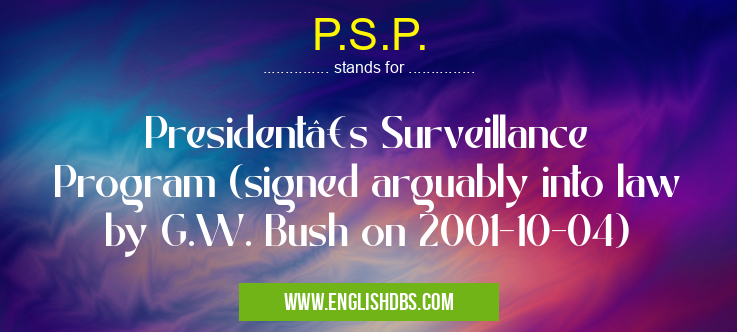What does P.S.P. mean in US GOVERNMENT
The President's Surveillance Program (P.S.P.) was an executive order signed by former President George W. Bush on October 4, 2001, in response to the terrorist attacks of September 11th, 2001. It authorized the government to carry out warrantless surveillance of emails and phone calls between US citizens and people located overseas. This program raised numerous legal questions due to its authorization of warrantless surveillance, which many considered a violation of Fourth Amendment rights protecting individuals against unreasonable search and seizure.

P.S.P. meaning in US Government in Governmental
P.S.P. mostly used in an acronym US Government in Category Governmental that means President’s Surveillance Program (signed arguably into law by G.W. Bush on 2001-10-04)
Shorthand: P.S.P.,
Full Form: President’s Surveillance Program (signed arguably into law by G.W. Bush on 2001-10-04)
For more information of "President’s Surveillance Program (signed arguably into law by G.W. Bush on 2001-10-04)", see the section below.
Essential Questions and Answers on President’s Surveillance Program (signed arguably into law by G.W. Bush on 2001-10-04) in "GOVERNMENTAL»USGOV"
What is the P.S.P.?
The President's Surveillance Program (P.S.P.) was an executive order signed by former President George W. Bush on October 4, 2001 allowing for warrantless surveillance of emails and phone calls between US citizens and people located overseas..
What motivated the signing of the P.S.P.?
The P.S.P was signed in response to the terrorist attacks of September 11th, 2001 in order to better ensure safety for American citizens against terrorism-related activities overseas.
What type of surveillance was permitted under this program?
The P.S.P authorized warrantless surveillance of emails and phone calls between US citizens and people located overseas.
Did the P.S.P violate any constitutional rights?
Yes, the P.S.P raised numerous legal questions due to its authorization of warrantless surveillance, which many considered a violation of Fourth Amendment rights protecting individuals against unreasonable search and seizure.
Who signed the P.S.P into law?
The P.S.P was signed into law by former president Geroge W bush on October 4th, 2001.
Final Words:
In response to increased security concerns following 9/11, Former President George W Bush implemented the President's Surveillance Program (PSP) which enabled laws authorizing warrantless electronic communications between US citizens abroad as well as raising some constitutional issues over alleged violationsof Fourth Amendment rights pertainingto search and seizure without proper judicial review or cause.
